Joy Inc. Dream job and business processes based on joy
Do you know the software company Menlo Innovations from the town of Ann Arbor in Michigan? For 14 years, these guys got on the cover of Forbes and the pages of The Wall Street Journal, won a ton of awards and were among the 500 fastest growing private companies in America. And they spent several thousand excursions around their office, giving visitors the opportunity to immerse themselves in the atmosphere of the company and see all the work processes from the inside.
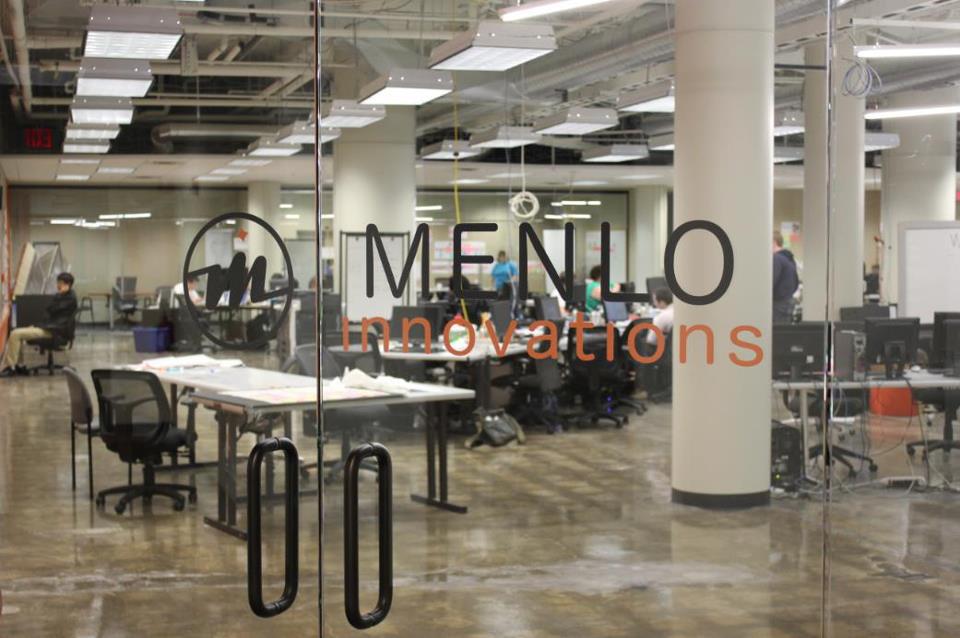
The secret of success of Menlo Innovations lies in the fact that the company’s management lays the joy and happiness of its employees in the foundation of all business processes. Of course, they do not forget about the happiness of their customers and the joy of the end users of their products.
How to build a successful business, one of the main goals of which is the joy and happiness of employees, says the company's CEO Richard Sheridan in his book “Dream Work” (I like the original name “Joy Inc. How We Built A Workplace People Love”).
Although the book deals more with the organization of the work of programmers, testers and project managers, I see that the philosophy of joy and pleasure can be part of any business. While reading the book, I constantly found myself thinking “we have this in Alconost too”, although we do without an office , and apart from programmers and managers, we have translators, video designers, contextual advertising specialists, marketers, and many other great people.
')
I took the liberty to summarize everything Richard Sheridan tells of, to a few principles of organizing business processes based on joy and happiness.

Menlo has no barriers between people in the truest sense of the word: all employees are in one big openspace room. Workplaces are mobile and employees often move tables, forming groups depending on the task they are performing.
By the way, Menlo recognizes only extreme programming, when two people work at the same computer, and the partners often change, thus avoiding the appearance of “prisoners of knowledge towers”: key employees, without whom the project will stop.
Workplaces of managers are in the same place, among other employees. Separate cabinets are used only for negotiations that require privacy and silence.
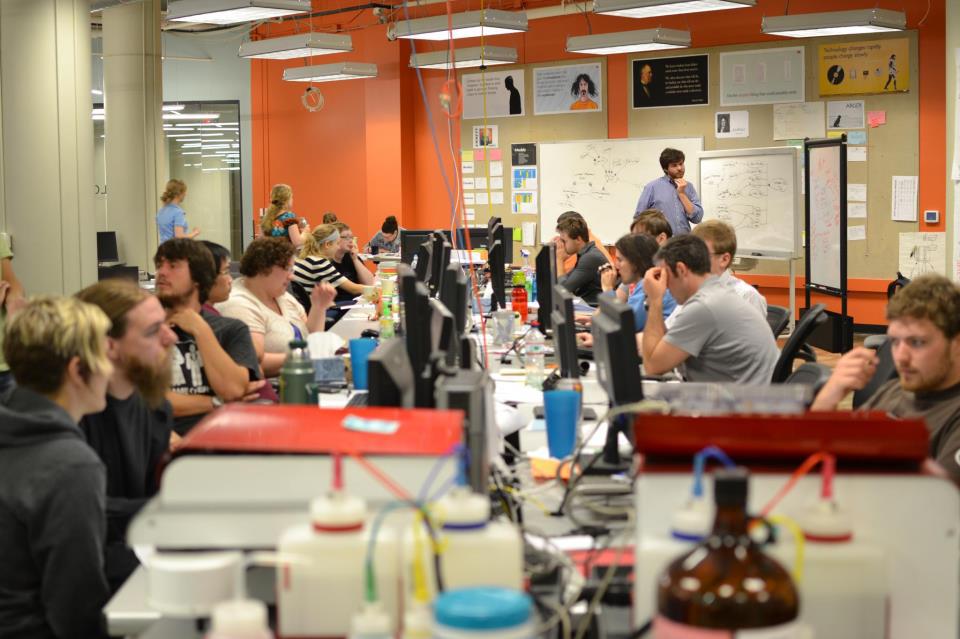
Menlo tried to get rid of not only physical barriers: every employee can turn to a colleague, boss and manager with any question, comment or suggestion.
Menlo guys don't like bulky project management systems.
The budget and work plan of each project in Menlo is a large board in the middle of the office, drawn on the cells (days and weeks), with task cards, the physical size of which depends on their time. A limited number of cards are placed on the board (after all, the board area, and with it the number of days and the project budget are limited). And when a project manager or a client, or even the CEO of a company, asks the programmer “to quickly do this simple and seemingly fast task out of the queue”, he gets the answer “hey, look, I just have nowhere to put another card on the board, let's coordinate , what other cards I can now refuse. ”
And this board allows employees to see each other's work, understand their progress and the tasks they will have to work on in the future.
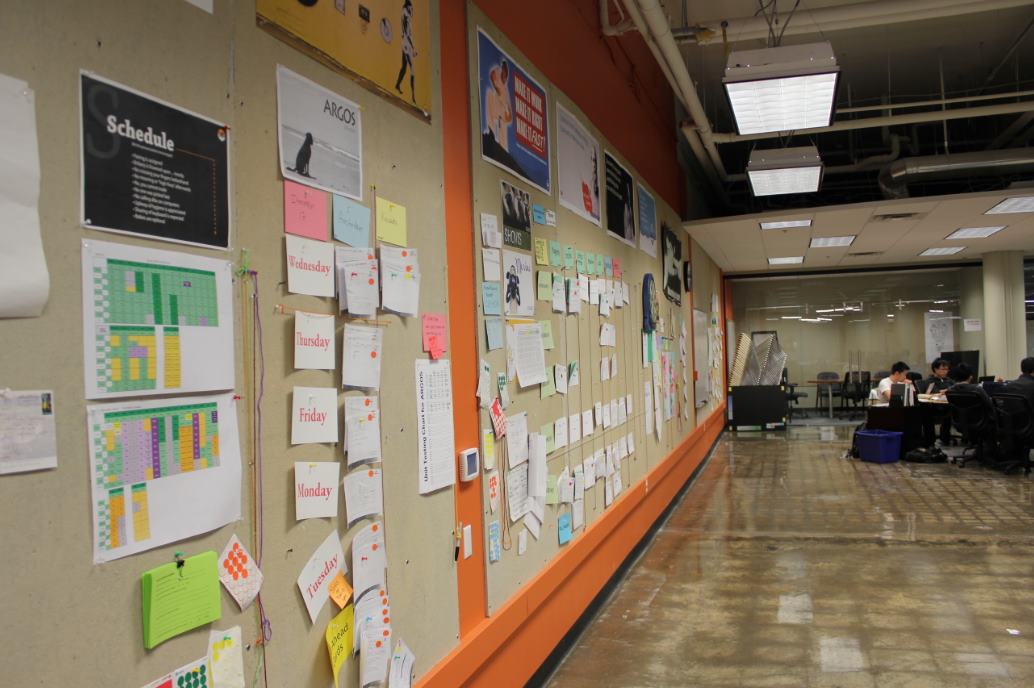
Once a week, all participants (and sometimes customers) of a project arrange a “stand-up”, at which they talk about the results of their work and discuss the plan for the next week.
So employees constantly see and feel the result of their work, and retain the vision of the entire project, even if they are working on an isolated task.
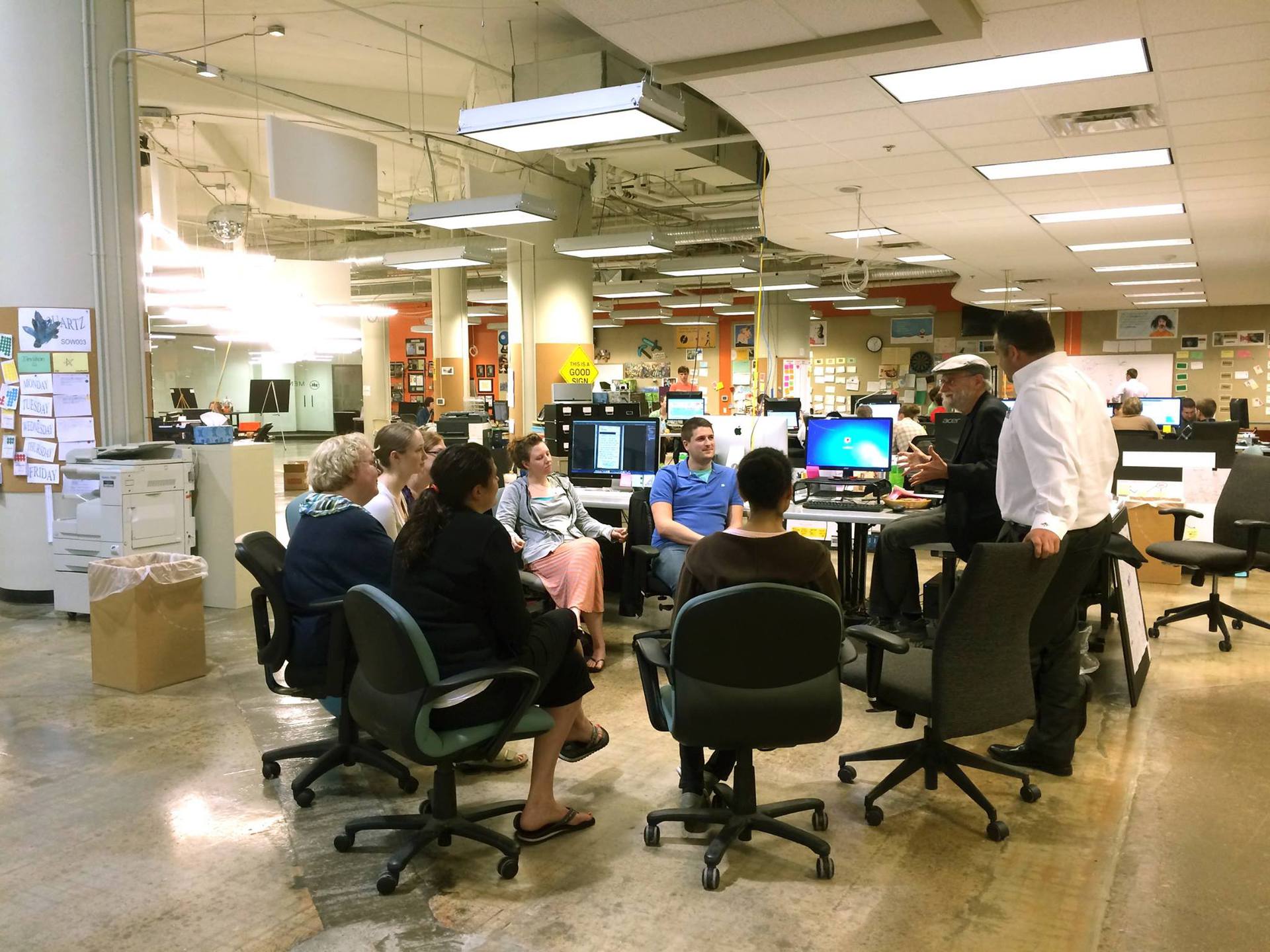
Errors in Menlo are not a crime, but steps towards a goal. The team accepts the mistakes made and does not spend energy on catching and punishing the “criminal”, but moves on. One of the company's mottos is “let's make more mistakes”.
Menlo employees are not afraid to make mistakes, they are not afraid of changes, they are not afraid to talk about what they think, they are not afraid to be called to work on vacation, they are not afraid of processing and working on weekends (there is simply no such thing), they are not afraid of managers and customers.
When an employee is forced to choose between work and, for example, his personal life, work and personal life, as a rule, suffer. In Menlo, employees are allowed to bring small children to the office, where a special place is organized for them. Thus, the parents have no choice between “I have no one to leave the child with today” and “I don’t have time to complete the project”. Another Menlo experiment is a separate place in the pet staff office. And of course, employees can work remotely, if, for example, they need to care for sick relatives.
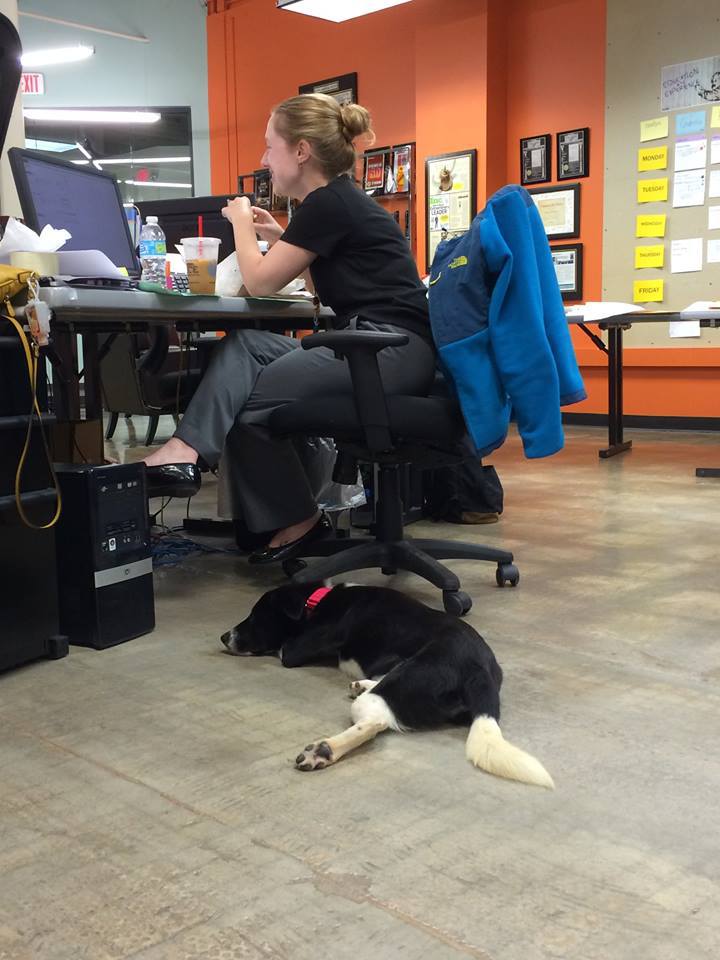
One of the most frequently heard phrases in Menlo is “let's try and see what happens.”
If one of the employees has an unusual idea for a project or for organizing a company's work, then most likely the Menlo management will support it and conduct an experiment to test the idea. And if the experiment turns out to be unsuccessful, it will still be regarded as a positive experience. Virtually everything in Menlo is the result of such bold and absurd at first glance experiments.
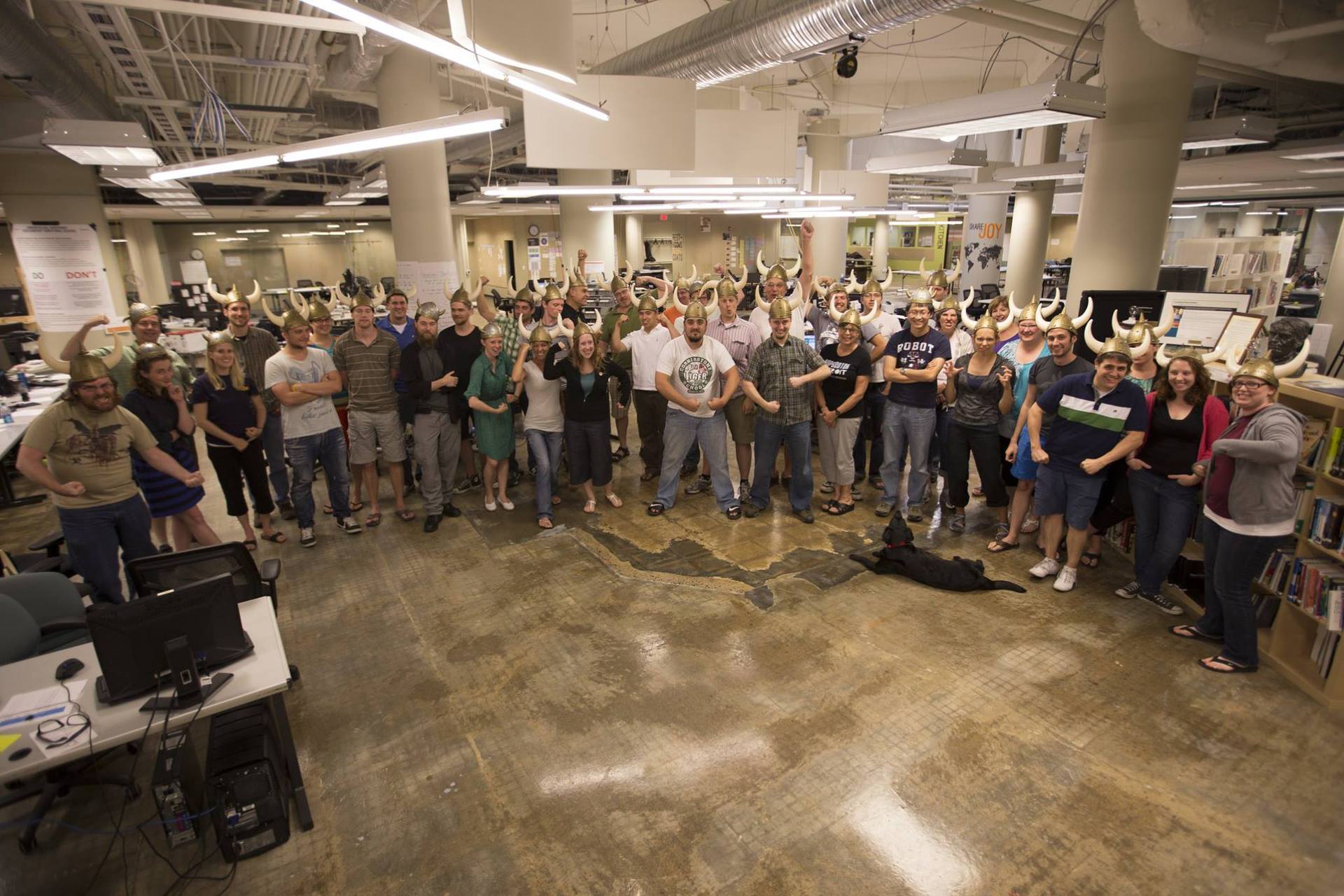
Menlo programmers are constantly using new technologies and languages to work on customer projects.
Menlo also practices taking shares of companies in payment for their services. Shares are distributed among the employees (if desired, of course, the employee) working on the project. This not only motivates to work with full efficiency, but also allows simple programmers, testers and project managers to earn big money, an order of magnitude more than the usual annual salary.
By the way, now among the ordinary Menlo employees there are more than ten multimillionaires who continue to work despite the fact that they no longer need money. In my opinion, this is the best proof that building a business based on a philosophy of joy and happiness fully pays for itself.
And how in your company think about the joy of employees?
about the author
Alconost is engaged in the localization of applications, games and websites in 60 languages. Language translators, linguistic testing, cloud platform with API, continuous localization, 24/7 project managers, any formats of string resources.
We also make advertising and training videos - for websites selling, image, advertising, training, teasers, expliners, trailers for Google Play and the App Store.
Read more: https://alconost.com

The secret of success of Menlo Innovations lies in the fact that the company’s management lays the joy and happiness of its employees in the foundation of all business processes. Of course, they do not forget about the happiness of their customers and the joy of the end users of their products.
How to build a successful business, one of the main goals of which is the joy and happiness of employees, says the company's CEO Richard Sheridan in his book “Dream Work” (I like the original name “Joy Inc. How We Built A Workplace People Love”).
Although the book deals more with the organization of the work of programmers, testers and project managers, I see that the philosophy of joy and pleasure can be part of any business. While reading the book, I constantly found myself thinking “we have this in Alconost too”, although we do without an office , and apart from programmers and managers, we have translators, video designers, contextual advertising specialists, marketers, and many other great people.
')
I took the liberty to summarize everything Richard Sheridan tells of, to a few principles of organizing business processes based on joy and happiness.

No boundaries
Menlo has no barriers between people in the truest sense of the word: all employees are in one big openspace room. Workplaces are mobile and employees often move tables, forming groups depending on the task they are performing.
By the way, Menlo recognizes only extreme programming, when two people work at the same computer, and the partners often change, thus avoiding the appearance of “prisoners of knowledge towers”: key employees, without whom the project will stop.
Workplaces of managers are in the same place, among other employees. Separate cabinets are used only for negotiations that require privacy and silence.

Menlo tried to get rid of not only physical barriers: every employee can turn to a colleague, boss and manager with any question, comment or suggestion.
Simplicity and transparency
Menlo guys don't like bulky project management systems.
The budget and work plan of each project in Menlo is a large board in the middle of the office, drawn on the cells (days and weeks), with task cards, the physical size of which depends on their time. A limited number of cards are placed on the board (after all, the board area, and with it the number of days and the project budget are limited). And when a project manager or a client, or even the CEO of a company, asks the programmer “to quickly do this simple and seemingly fast task out of the queue”, he gets the answer “hey, look, I just have nowhere to put another card on the board, let's coordinate , what other cards I can now refuse. ”
And this board allows employees to see each other's work, understand their progress and the tasks they will have to work on in the future.

See and feel the results of their work
Once a week, all participants (and sometimes customers) of a project arrange a “stand-up”, at which they talk about the results of their work and discuss the plan for the next week.
So employees constantly see and feel the result of their work, and retain the vision of the entire project, even if they are working on an isolated task.

Make more mistakes
Errors in Menlo are not a crime, but steps towards a goal. The team accepts the mistakes made and does not spend energy on catching and punishing the “criminal”, but moves on. One of the company's mottos is “let's make more mistakes”.
Culture of no fear
Menlo employees are not afraid to make mistakes, they are not afraid of changes, they are not afraid to talk about what they think, they are not afraid to be called to work on vacation, they are not afraid of processing and working on weekends (there is simply no such thing), they are not afraid of managers and customers.
Failure to choose between work and something else
When an employee is forced to choose between work and, for example, his personal life, work and personal life, as a rule, suffer. In Menlo, employees are allowed to bring small children to the office, where a special place is organized for them. Thus, the parents have no choice between “I have no one to leave the child with today” and “I don’t have time to complete the project”. Another Menlo experiment is a separate place in the pet staff office. And of course, employees can work remotely, if, for example, they need to care for sick relatives.

Experiments
One of the most frequently heard phrases in Menlo is “let's try and see what happens.”
If one of the employees has an unusual idea for a project or for organizing a company's work, then most likely the Menlo management will support it and conduct an experiment to test the idea. And if the experiment turns out to be unsuccessful, it will still be regarded as a positive experience. Virtually everything in Menlo is the result of such bold and absurd at first glance experiments.

Development
Menlo programmers are constantly using new technologies and languages to work on customer projects.
Menlo also practices taking shares of companies in payment for their services. Shares are distributed among the employees (if desired, of course, the employee) working on the project. This not only motivates to work with full efficiency, but also allows simple programmers, testers and project managers to earn big money, an order of magnitude more than the usual annual salary.
By the way, now among the ordinary Menlo employees there are more than ten multimillionaires who continue to work despite the fact that they no longer need money. In my opinion, this is the best proof that building a business based on a philosophy of joy and happiness fully pays for itself.
And how in your company think about the joy of employees?
about the author
Alconost is engaged in the localization of applications, games and websites in 60 languages. Language translators, linguistic testing, cloud platform with API, continuous localization, 24/7 project managers, any formats of string resources.
We also make advertising and training videos - for websites selling, image, advertising, training, teasers, expliners, trailers for Google Play and the App Store.
Read more: https://alconost.com
Source: https://habr.com/ru/post/244633/
All Articles